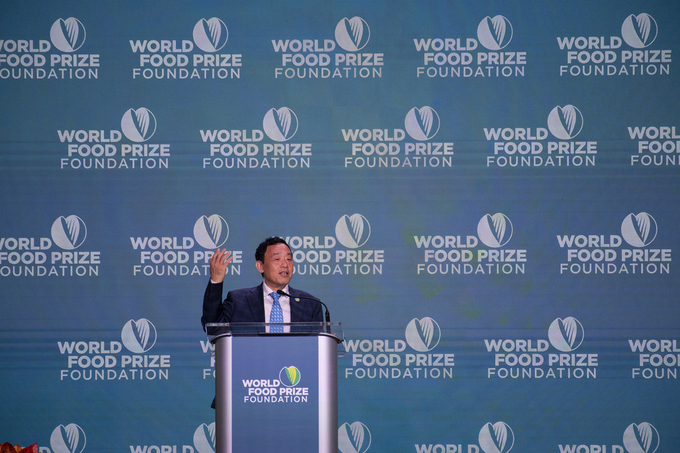May 20, 2025 | 21:09 GMT +7
May 20, 2025 | 21:09 GMT +7
Hotline: 0913.378.918
May 20, 2025 | 21:09 GMT +7
Hotline: 0913.378.918

FAO Director-General QU Dongyu.
“Harnessing change is a call to move from action to evolution, and youth have a paramount role as the most important agents of change,” QU Dongyu, Director-General of the Food and Agriculture Organization of the United Nations (FAO), said Tuesday in his address at the Borlaug International Dialogue of the World Food Prize 2023 opening ceremony in Iowa.
The annual prize, in honor of Norman Borlaug, considered one of the fathers of the Green Revolution that lifted hundreds of millions of people out of hunger thanks to his work on higher-yielding wheat varieties, was awarded this year to Heidi Kühn.
The Director-General noted how her work, focused on revitalizing farmland and livelihoods after devastating conflicts, demonstrates the key role of agriculture in humanitarian response. “The principles that underline Dr Borlaug’s luminary work in the field of food and agriculture were the same that guided world leaders to establish the Food and Agriculture Organization of the United Nations 80 years ago,” Qu said, noting that like Borlaug he himself was the son of a farmer and has spent his career driven by the realization that agriculture can save the world by feeding people and lifting them out of poverty.
“We are here to reaffirm our commitment to work together to bring food and agricultural solutions to the scale needed to increase the quality, quantity, availability, affordability, and accessibility of food for all,” the Director-General said at the event, held in the city of Des Moines.
Today, FAO is well positioned “to better serve its Members, and above all the farmers of the world,” he said, noting that recent reforms have made the UN specialized agency more agile, more efficient and more fit-for-purpose, providing professional and scientific expertise to all.
“A new thinking at FAO has led us to a different path. We continue to leverage our collective expertise to help vulnerable populations and stand united to achieve real progress,” he said. “Our focus is to attain zero hunger, and to ensure that the world’s farmers are well supported, and rural areas are made more attractive for the younger generations.
”Four Betters, five key actions
The Director-General emphasized how the aspiration of the Four Betters - Better Production, Better Nutrition, a Better Environment and a Better Life, leaving no one behind - underpin FAO’s Strategic Framework 2022-31. “Collective actions are necessary to meet both immediate and longer-term objectives,” he said.
He listed five key actions that need to be addressed to meet global objectives. First, all countries must commit to well-functioning markets and market transparency.Second, vulnerable countries need support to meet their food and fertilizer needs.
Third, we must accelerate the transformation of global agrifood systems, doing so by making the right investments urgently and strengthening the provision of public goods such as soil maps and extension and advisory services as well as innovation, research and improving infrastructure in rural areas. Fourth, the private sector, which is still under-engaged and under-utilized, must be engaged.
Fifth, filling knowledge gaps through science and innovation is essential to end hunger.FAO has bolstered its activities by strengthening its Investment Centre, intensifying work on emergencies with a new mandate that includes resilience building, upgrading its strategic partnership with the International Atomic Energy Agency and further consolidating its work on climate change, biodiversity and the environment, he said.
FAO has also rolled out new flagship initiatives such as the Hand-in-Hand Initiative and its associated Geospatial Platform, the 1000 Digital Villages Initiative, the One Country One Priority Product Initiative and the Green Cities Initiative. Qu also highlighted how women and youth continue to be a focus for him, and that following the creation of the FAO Youth Committee and FAO Women’s Committee upon taking office in 2019, he was now creating a new Office for Youth and Women to further support work in this area.
Making it happen
FAO’s Director-General pointed to the $2.1 billion in voluntary contributions mobilized by FAO in 2022, a historical high for the Organization and more than 60 percent higher than usual, as a reflection of the confidence and trust Members have placed in the new FAO and its capacity to achieve even more than before.
“FAO is now fit to walk the talk,” he said. He hailed all those working to achieve breakthroughs to reduce inequalities, pursue gender parity and provide opportunities for youth in the agricultural sector.He specifically cited the Vision for Adapted Crops and Soils (VACS) initiative by the United States of America to support African governments, farmers, researchers and civil society organizations as they prepare the continent’s agrifood systems for the challenges posed by the climate crisis.
“This is science in action, and this is the action that FAO supports,” Qu said.“At FAO we have visionary strategies in place, but we need more resources, especially from voluntary contributions,” he said. “Resource mobilization is no longer simply transactional for FAO,” he added, saying the Organization is looking to build lasting partnerships, leverage strategic partnerships and “accelerate the establishment of transformative partnerships with both the private and the public sector.”
(FAO.org)

(VAN) Attempts to bring down the price of the Japanese staple have had little effect amid a cost-of-living crisis.

(VAN) Fourth most important food crop in peril as Latin America and Caribbean suffer from slow-onset climate disaster.

(VAN) Shifting market dynamics and the noise around new legislation has propelled Trouw Nutrition’s research around early life nutrition in poultry. Today, it continues to be a key area of research.

(VAN) India is concerned about its food security and the livelihoods of its farmers if more US food imports are allowed.

(VAN) FAO's Director-General emphasises the need to work together to transform agrifood systems.

(VAN) Europe is facing its worst outbreak of foot-and-mouth since the start of the century.

(VAN) The central authorities, in early April, released a 10-year plan for rural vitalization.